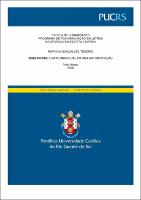| Share record |


|
Please use this identifier to cite or link to this item:
https://tede2.pucrs.br/tede2/handle/tede/8345Full metadata record
| DC Field | Value | Language |
|---|---|---|
| dc.creator | Tenório, Patricia Gonçalves | - |
| dc.creator.Lattes | http://lattes.cnpq.br/9073543599548700 | por |
| dc.contributor.advisor1 | Brasil, Luiz Antonio de Assis | - |
| dc.contributor.advisor1Lattes | http://lattes.cnpq.br/0812059400565883 | por |
| dc.date.accessioned | 2018-11-06T17:34:02Z | - |
| dc.date.issued | 2018-10-08 | - |
| dc.identifier.uri | http://tede2.pucrs.br/tede2/handle/tede/8345 | - |
| dc.description.resumo | Doze horas é uma novela ensaística em três camadas. Narrada em terceira pessoa do singular, conta a história de Arabella Fantini, quarenta e cinco anos, solteira e sem filhos, nascida em Recife, residente em Porto Alegre, Brasil, e museóloga do Museu de Arte do Rio Grande do Sul – MARGS. Ela traz à tona artistas desconhecidos, e, uma bela tarde, recebe a carta com fotografias da obra de Fernandes Vieira, artista português que o remetente afirma ter conhecido seu pai, desaparecido desde os treze anos da museóloga. Toda a narração é feita durante o voo de doze horas para Lisboa, resgatando o passado, descrevendo o presente, antecipando o futuro, criando diálogos imaginários com “o rapaz ao lado”. Esta é a primeira camada. A segunda camada é narrada em primeira pessoa do singular, por uma estudante de doutorado em Escrita Criativa, Manoela. Subentende-se que ela estuda na PUCRS, e seria uma mimesis do processo de construção da presente tese. A terceira camada encontra-se no ensaio teórico (na impessoalidade da primeira pessoa do plural), com os Diários de Bordo em anexo (na proximidade da primeira pessoa do singular). O ensaio teórico tem como objetivos, à luz dos conceitos de autobiografia, autoficção e diário encontrados em O pacto autobiográfico – de Rousseau à internet, do ensaísta e sociólogo francês Philippe Lejeune, e de “O mito individual do neurótico”, do psicanalista francês Jacques Lacan, investigar as camadas intercambiáveis da tese, assim como apresentar o gênero híbrido da autobioficção. | por |
| dc.description.abstract | Twelve hours is an essayist novel in three layers. Narrated in the third person singular, tells the story of Arabella Fantini, forty-five years old, single and childless, born in Recife, resident in Porto Alegre, Brazil, and museologist at the Art Museum of Rio Grande do Sul – MARGS. She brings up unknown artists and, one fine afternoon, receives the letter with photographs of the work of Fernandes Vieira, Portuguese artist that the sender claims to have met her father, who has disappeared since the museologist’s thirteenth birthday. All the narration is done during the twelve hours flight to Lisbon, rescuing the past, describing the present, anticipating the future, creating imaginary dialogues with “the man next door”. This is the first layer. The second layer is narrated in the first person singular, by a PhD student in Creative Writing, Manoela. It is understood that she studies in PUCRS, and would be a mimesis of the process of construction of the present thesis. The third layer is in the theoretical essay (in the impersonality of the first person plural), with the attached Logbook (in the vicinity of the first person singular). The theoretical essay has as objectives, in the light of the concepts of autobiography, autofiction and diary found in The autobiographical pact – by Rousseau to the internet, from the French essayist and sociologist Philippe Lejeune, and “The individual myth of the neurotic”, from the French psychoanalyst Jacques Lacan, to investigate the interchangeable layers of the thesis, as well as to present the hybrid genre of autobiofiction. | eng |
| dc.description.provenance | Submitted by PPG Letras ([email protected]) on 2018-11-06T13:08:53Z No. of bitstreams: 1 TESE - Patricia Gonçalves Tenório.pdf: 3032507 bytes, checksum: c511c0c604a9fadd02ea3e24bd91899a (MD5) | eng |
| dc.description.provenance | Approved for entry into archive by Caroline Xavier ([email protected]) on 2018-11-06T17:25:52Z (GMT) No. of bitstreams: 1 TESE - Patricia Gonçalves Tenório.pdf: 3032507 bytes, checksum: c511c0c604a9fadd02ea3e24bd91899a (MD5) | eng |
| dc.description.provenance | Made available in DSpace on 2018-11-06T17:34:02Z (GMT). No. of bitstreams: 1 TESE - Patricia Gonçalves Tenório.pdf: 3032507 bytes, checksum: c511c0c604a9fadd02ea3e24bd91899a (MD5) Previous issue date: 2018-10-08 | eng |
| dc.format | application/pdf | * |
| dc.thumbnail.url | http://tede2.pucrs.br:80/tede2/retrieve/173513/TESE%20-%20Patricia%20Gon%c3%a7alves%20Ten%c3%b3rio.pdf.jpg | * |
| dc.language | por | por |
| dc.publisher | Pontifícia Universidade Católica do Rio Grande do Sul | por |
| dc.publisher.department | Escola de Humanidades | por |
| dc.publisher.country | Brasil | por |
| dc.publisher.initials | PUCRS | por |
| dc.publisher.program | Programa de Pós-Graduação em Letras | por |
| dc.rights | Acesso Aberto | por |
| dc.subject | Autobioficção | por |
| dc.subject | Literatura | por |
| dc.subject | Linguagem Digital | por |
| dc.subject | Psicanálise | por |
| dc.subject | Escrita Criativa | por |
| dc.subject.cnpq | LINGUISTICA, LETRAS E ARTES::LETRAS | por |
| dc.title | Doze horas : o mito individual em uma autobioficção | por |
| dc.type | Tese | por |
| dc.restricao.situacao | Trabalho não apresenta restrição para publicação | por |
| Appears in Collections: | Programa de Pós-Graduação em Letras | |
Files in This Item:
| File | Description | Size | Format | |
|---|---|---|---|---|
| TESE - Patricia Gonçalves Tenório.pdf | TES_PATRICIA_GONCALVES_TENORIO_COMPLETO | 2.96 MB | Adobe PDF |  Download/Open Preview |
Items in DSpace are protected by copyright, with all rights reserved, unless otherwise indicated.




